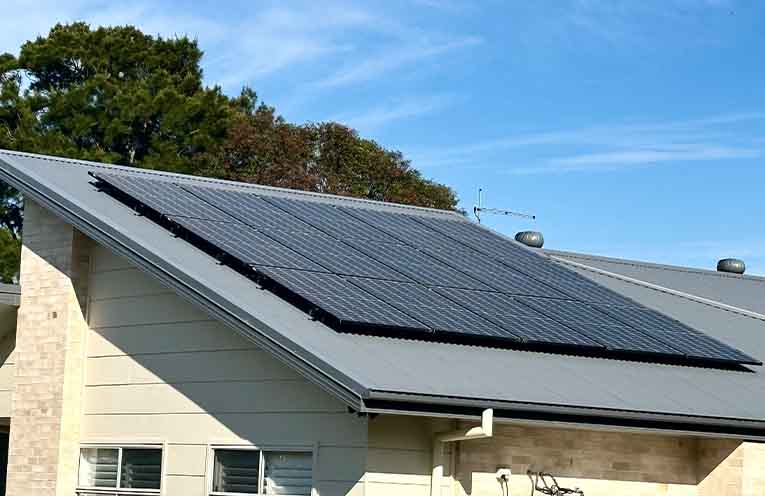ALL sectors have weighed in on the Federal Coalition’s decision to abandon Net Zero by 2050.
This major tool for combatting climate change involves balancing the amount of greenhouse gases emitted into the atmosphere with the amount removed.
Patrick Leyland, Chief Digital Officer at Populares and former Director of Digital Campaigns for the Australian Labor Party, has previously recommended that Labor highlights the economic benefits to ordinary people when discussing energy policy, rather than the seemingly abstract “Net Zero”.
He told News Of The Area that an electorate like Cowper is positioned to benefit enormously from the growth of renewable energy, and the advantages are overwhelmingly economic.
Stronger local economy
Local energy generation brings down costs.
The North Coast sits at the far end of transmission lines, which makes power more expensive and vulnerable to outages.
When more energy is produced closer to where people live and work, households and small businesses see lower bills and more reliable supply.
Mr Leyland also pointed out that renewables bring jobs.
Large-scale wind, solar, storage and grid upgrades create a surge in construction work – the kind of trades and contractor jobs that keep money in the community and open up long-term roles in maintenance, operations and community energy initiatives.
He said affordable clean energy is also becoming a magnet for new industries and manufacturers, such as food processors, data-driven businesses and emerging clean-tech industries.
These all prioritise regions with stable, low-cost power.
Locally-produced renewable energy gives communities like Cowper greater protection from volatility in international coal and gas prices.
Renewables also offer diversified income streams for farmers and landholders, reduced energy costs for irrigation and refrigeration, and opportunities for on-farm generation.
“Taken together, renewables give regions like Cowper the chance to build a stronger, more self-reliant local economy, one with lower energy costs, more jobs and new industries that keep young people in the region.”
Coalition’s position
Federal Member for Cowper Pat Conaghan released a statement saying the Coalition’s joint agreement to drop Net Zero is a move that will help Australian households and businesses achieve a cheaper, better and fairer way to lower emissions.
“The Coalition’s decision to drop Net Zero puts Australians and the electorates that we represent first,” the statement read.
“Our plan is far cheaper than Labor’s *$9 trillion Net Zero plan, which would put Medicare and NDIS at risk.
“OECD countries have been cutting their emissions by one percent per year while Australia has been cutting its emissions by about two percent per year – double the OECD rate.
“We should do our fair share to reduce global emissions, but not more than the rest of the world.”
Mr Conaghan said energy would be cheaper because: “Our policy means opening up our grid to nuclear and removing the moratorium, as well as using emission reduction technology in gas and coal, like carbon capture and storage, while having renewables as a sensible proportion of the mix.
“Australia can’t mitigate all the world’s emissions when we’re only a bit over one percent of global emissions.
“So, why wouldn’t we focus more on adaptation with direct environmental action in land management, and investment in disaster mitigation like flood levees, dams and more cool burns?
“Labor’s 2030 and 2035 targets will reduce our emissions by 4.7 percent per year, putting pressure on households and industry.”
Report ‘misrepresented’
The Coalition’s figure of *$9 trillion is based on a report from Net Zero Australia (NZAu), which is a partnership between the University of Melbourne, the University of Queensland, and Princeton University.
It aims to be “technology neutral, evidence driven and non-political”.
NZAu issued a media release on 5 November criticising how its research had been interpreted and also confused with a report from 2023.
“Different individuals and groups have been misrepresenting key cost estimates from the NZAu Australia Project as ‘the cost of Australia reaching net zero’,” it said.
It clarified that:
– projected costs for reaching Net Zero in Australia by 2050 would be $300 billion over 25 years, not $9 trillion.
– this cost would consist primarily of overseas investment
– cost projections for non-renewable energy resources did not include their substantial fuel costs
The Climate Council, a spin-off from the Climate Commission, which was abolished by the Coalition in 2013, said that abandoning Net Zero “would spell disaster for Australia’s climate, economy and household bills”.
It claims that Australian Government spending on disaster recovery would increase seven-fold by 2090, productivity would take a $135-423 billion hit by 2063 – with workers hampered by extreme heat – and deaths caused by heatwaves would increase by 440 percent in Sydney and 260 percent in Melbourne.
The Council said policy uncertainty would disrupt confidence and clarity for business, costing the economy $2 trillion in lost investment.
Weaker exports and lower growth over the next 24 years and prolonged reliance on gas and coal, could see household power bills increase by $449 by 2030.
CEO Amanda McKenzie, said: “What the Coalition is really advocating for is a more dangerous future for all Australians.
“More floods in Taree and Grafton, more fire seasons like Black Summer, and the demise of the Great Barrier Reef.
“They’ve gone from: ‘I don’t hold a hose, mate’ to ‘let’s put fuel on the fire’.”
Professor Joel Gilmore, Climate Councilor and energy expert, said: “Renewable power is already the lowest-cost form of new energy.
“Four million Australian households with rooftop solar know that.”
When asked by Sky News if renewable energy is more expensive, Federal Minister for Climate Change and Energy Chris Bowen, said: “Not only do I not agree, economists don’t agree, scientists don’t agree, the Australian people don’t agree”.
By Andrew VIVIAN



